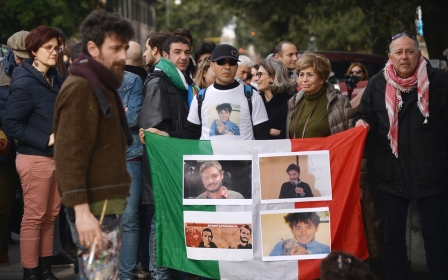Egyptians express solidarity with Italian student's family as probe continues

Egyptian investigators spent more than four hours on Thursday briefing Italian counterparts on their so-far inconclusive probe into the brutal murder of an Italian student in Cairo earlier this year.
Earlier this week, a team of five Egyptian prosecutors and police arrived in Rome with a 2,000-page file on the investigation into the murder of Giulio Regeni, a 28-year-old PhD student at Cambridge University.
Regeni disappeared in central Cairo on 25 January. His body was found outside the city on 3 February bearing the signs of torture, with an autopsy later concluding that it had been inflicted over several days.
Khaled Shalaby, the lead police investigator on the case - who was reportedly convicted previously for torturing a detainee to death and fabricating police reports - was not in attendance in Rome, The Times reported on Friday.
Documents collected by the Egyptians, which included 200 eyewitness accounts, were presented to Rome prosecutor Giuseppe Pignatone and senior security officials in a closed-doors meeting at a police training college.
There will be a follow-up meeting on Friday between the Egyptian delegation and the Italian prosecutor.
Italian officials are not convinced enough is being done to bring Regeni's killer or killers to justice and have warned of consequences if the Egyptians do not present a credible account of everything they know.
To date, there has been no attempt by the Egyptian team to contact Regeni's family, their lawyer said.
An Egyptian mother whose son went missing in 2003 wrote a letter to Regeni's mother, which was published on Thursday in the Italian daily Corriere della Sera.
The woman said she envied the interest and support the family had received from the Italian government, and said the hearts of Egyptian mothers were with Regeni's.
"I, and thousands of other Egyptian mothers, would like to see our sons again, even if they are wrapped in white, stained by their own blood, even if they are presented to the public prosecutor with swollen faces caused by torture, and even if we were to see them hung, but we would like to see them at least.
"We would like to see the media in our country speak of our missing sons and tragedies, instead of accusing us of telling lies, thus increasing our suffering. We would like the public prosecutor to listen to us, just as Italian justice did in your case, and give a path to justice here also, to give back a minimum of rights to our families," the letter said.
Diplomatic relations at risk
The case is a testing one for Italian Prime Minister Matteo Renzi, who has fostered a close relationship with Egypt's military-backed president, Abdel Fattah al-Sisi, but is under pressure to respond to public anger over the murder.
On Wednesday, Italian Foreign Minister Paolo Gentilioni said there would be "proportionate" consequences if Rome's demands for greater transparency as to Regeni's fate were not met.
"The relationship is a huge deal for Italy but Egypt has burnt most of its credit in the last two months in a not very smart way," said Mattia Toaldo, of the European Council on Foreign Relations (ECFR) in London.
Italy could withdraw its ambassador over the murder, warn its citizens against travel to Egypt on security grounds or seek backing from European Union partners to put pressure on Cairo over the case, Toaldo said.
But all these options are problematic: an ambassador call-back risks being seen domestically as purely symbolic gesture while a travel ban would hurt Egypt's battered tourism industry at the cost of escalating the rift with Sisi's government.
Other EU countries might not be keen to jeopardise their relations with Egypt to support Italy, particularly given Rome's past courting of the Sisi government.
In the UK, Regeni's case was highlighted in a foreign affairs select committee report released on Tuesday as an example of the Foreign Office's “deprioritisation” of human rights in its work.
“I think the office hasn’t really stood up to the plate in the way the Italians and people would expect when a Cambridge doctoral student appears to all intents and purposes to have fallen into the hands of Egyptian security forces and ended up being tortured and killed," Crispin Blunt, the committee’s chair, told BBC Radio 4 on Tuesday.
“I think we should be making a real noise about not that, not least because it helps the hand of President Sisi who is beginning to show signs of trying to address the culture of impunity in the security forces.”
‘Lies again and again'
Italian officials were initially told Regeni had been killed in a car accident, and then that his death had been linked to a personal dispute.
At the end of last month, Egypt publicly announced police had killed members of a criminal gang they suspected of murdering him.
That version of events was greeted with scepticism in Italy, where many suspect the murder was the work of elements in the security services, a theory Cairo dismisses as without foundation.
A hashtag trending on Twitter calls for justice for the men originally killed for Regeni's murder, who many believe were used as scapegoats.
Trending hashtag in Egypt "justice for the 5 before justice for Regeni". The 5 is ref. to the alleged Regeni killers whom police killed
— The Big Pharaoh (@TheBigPharaoh) April 8, 2016
Media coverage of the case has focused international attention on other disappearances and rights abuses in Sisi's Egypt.
Corriere della Sera published the names of 396 Egyptians believed to have vanished in the past eight months, presumably following arrest, The Times reported.
One of the Egyptian organisations that supplied the names of those who have disappeared is resisting efforts by the Egyptian government to close it.
Regeni's family have said they are thinking about releasing pictures of his mutilated body to keep the pressure on over his death.
Their stance was praised on Thursday by the mother of Khaled Said, whose 2010 killing by Egyptian police contributed to the wave of anger that led to the Arab spring uprising of 2011.
"I thank you for standing with us and caring about torture cases in Egypt," Laila Marzouk said in a video posted on YouTube.
MEE's Daniela Loffreda contributed to this story
New MEE newsletter: Jerusalem Dispatch
Sign up to get the latest insights and analysis on Israel-Palestine, alongside Turkey Unpacked and other MEE newsletters
Middle East Eye delivers independent and unrivalled coverage and analysis of the Middle East, North Africa and beyond. To learn more about republishing this content and the associated fees, please fill out this form. More about MEE can be found here.




